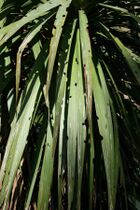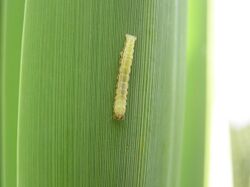Biology:Epiphryne verriculata
| Epiphryne verriculata | |
|---|---|
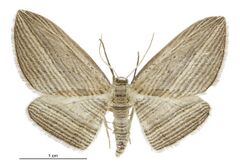
| |
| female | |
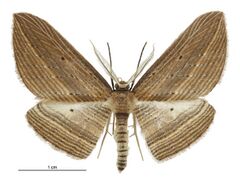
| |
| male | |
| Scientific classification | |
| Kingdom: | |
| Phylum: | |
| Class: | |
| Order: | |
| Family: | |
| Genus: | |
| Species: | E. verriculata
|
| Binomial name | |
| Epiphryne verriculata (Felder & Rogenhofer, 1875)
| |
| Synonyms[1] | |
| |
Epiphryne verriculata, the cabbage tree moth, is a moth in the family Geometridae. It is found only in New Zealand, and only feeds on the native cabbage tree (Cordyline australis); its wings are patterned to camouflage it against dead cabbage tree leaves.
Taxonomy
E. verriculata was first described by Baron Cajetan von Felder, Rudolf Felder & Alois Friedrich Rogenhofer in 1875 under the name Cidaria verriculata.[2][3]
Distribution and habitat
This moth is endemic to New Zealand and is very common, being widely distributed throughout the country.[4][5] Its favoured habitats are wetland and native forest, but it can be found in urban parks and gardens, as cabbage trees are commonly grown in cultivation.[5]
Life cycle
Eggs
The eggs of E. verriculata are bright green and are laid on the underside of leaves in neat parallel rows in autumn and spring.[4] As they mature the eggs change colour from bright green to brown and then finally to red. After approximately 14 days the eggs hatch and the caterpillars emerge.[1]
Larva
The caterpillar is green with red and dark brown lines. When fully grown it is approximately 2.5 cm long.[4] At night caterpillars feed on the new and unopened leaves of Cordyline australis; their flattened bodies allow them to squeeze in amongst the developing leaves.[6][1] The caterpillars create a characteristic pattern of damage, initially making holes and dark channels along the leaf and, as they grow, notches in the leaf edge.[7] As the leaf opens and grows the notches likewise grow and become more noticeable.[6] The larvae reach 25 mm in length before pupating, either on the cabbage tree in crevices or dead leaf bases or on the ground underneath.[7]
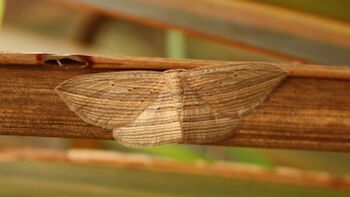
Adult
The wingspan of the adult moth is about 40 mm.[8] Adults can be seen from spring to late summer (October to May).[5] E. verriculata have light brown wings with parallel horizontal stripes that resemble the veins in dead cabbage tree leaves; the moth sits with its body perpendicular to the leaf's long axis and wings pressed up against the leaf, its markings lining up with the veins. If disturbed, the will only fly a short distance before finding another dead brown leaf to settle on, avoiding the green fresh leaves.[6] Although attracted to light, the adult moth is inconspicuous when resting by day on cabbage tree leaves, and this camouflage helps protect it from predators.[8]
Conservation status
Epiphryne verriculata is common throughout New Zealand and not regarded as threatened.[1]
References
- ↑ 1.0 1.1 1.2 1.3 Martin, N. A. (2016). "Factsheet: Cabbage tree moth - Epiphryne verriculata". Landcare Research New Zealand Ltd. http://nzacfactsheets.landcareresearch.co.nz/factsheet/InterestingInsects/Cabbage-tree-moth---Epiphryne-verriculata.html.
- ↑ Dugdale, J. S. (1988). "Lepidoptera - annotated catalogue, and keys to family-group taxa". Fauna of New Zealand 14: 179. https://www.landcareresearch.co.nz/__data/assets/pdf_file/0017/26324/FNZ14Dugdale1988.pdf. Retrieved 2018-01-17.
- ↑ Felder, Cajetan; Rogenhofer, Alois Friedrich (1864–1867). "Reise der österreichischen Fregatte Novara" (in en). Reise der österreichischen Fregatte Novara um die Erde in den Jahren 1857, 1858, 1859 Unter den Befehlen des Commodore B. Von W pt.9:Bd.2:Abt.2 (1864-1867) Atlas: Plate CXXXI fig 20. https://biodiversitylibrary.org/page/1221365.
- ↑ 4.0 4.1 4.2 Gaskin, D E (1966). The Butterflies and Common Moths of New Zealand. Christchurch: Whitcombe and Tombs Limited. p. 134.
- ↑ 5.0 5.1 5.2 Hoare, Robert J. B. (2014). A photographic guide to moths & butterflies of New Zealand. Ball, Olivier.. Auckland: New Holland Publishers (NZ) Ltd. pp. 94. ISBN 9781869663995. OCLC 891672034.
- ↑ 6.0 6.1 6.2 Early, John (2009). Know your New Zealand Insects and Spiders. Auckland: New Holland. pp. 140. ISBN 9781869662530.
- ↑ 7.0 7.1 Guthrie, Ruth J.; Sullivan, Jon J.; Buckley, Hannah L. (2008). "Patterns of host damage by the cabbage tree monophage Epiphryne verriculata Feld (Lepidoptera: Geometridae) across urban, rural and native forest habitats". New Zealand Entomologist 31 (1): 77–88. doi:10.1080/00779962.2008.9722169. https://www.researchgate.net/publication/233356149.
- ↑ 8.0 8.1 "T.E.R:R.A.I.N - Taranaki Educational Resource: Research, Analysis and Information Network - Epiphryne verriculata (Cabbage tree moth)" (in en). http://www.terrain.net.nz/friends-of-te-henui-group/local-butterflies-moths/cabbage-tree-moth.html.
External links
- The cabbage tree moth discussed on RNZ Critter of the Week, 26 January 2018
Wikidata ☰ Q5383164 entry
 |
